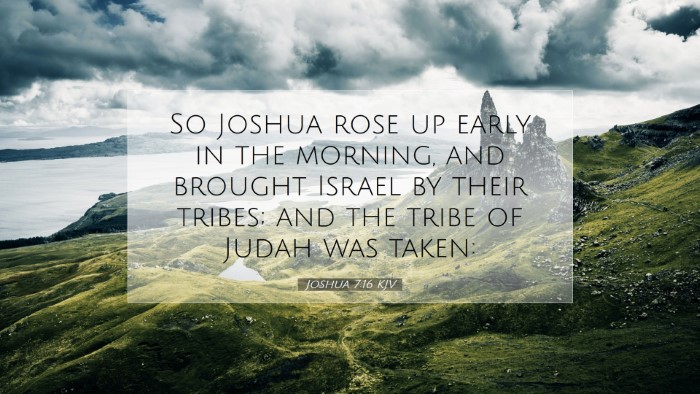Commentary on Joshua 7:16
Joshua 7:16 states: "So Joshua rose up early in the morning and brought Israel by their tribes; and the tribe of Judah was taken." This verse marks a pivotal moment in the narrative of the Israelite conquest of Canaan, particularly following the significant defeat at Ai. The analysis of this verse reveals profound insights into leadership, accountability, and the nature of divine justice.
Contextual Background
In the broader narrative, Israel has just experienced a shocking defeat due to the sin of Achan, who disobeyed God’s command regarding the spoils of Jericho. This incident illustrates the serious consequences of sin within the community and sets the stage for the account in chapter 7. Joshua's leadership is called into question as he seeks to discern the cause of Israel's failure.
Insights from Commentators
Matthew Henry's Commentary
Matthew Henry emphasizes Joshua’s proactive approach in addressing the sin within the camp, stating:
- Leadership in Crisis: Joshua rose early, which signifies his urgency and commitment to resolve the matter. This reflects a leader's responsibility to act decisively in times of trouble.
- Divine Selection: The casting of lots to identify the guilty tribe illustrates God's direct involvement in the affairs of His people. This method underscores the seriousness of communal sin and the necessity for scrutiny among the tribes.
- Judah's Selection: Judah being chosen first not only fulfills the prophetic significance of the tribe's future prominence but also sets a sobering tone for the consequence of sin within even the most favored tribe.
Albert Barnes' Notes on the Bible
Albert Barnes provides additional depth to the understanding of this passage:
- Accountability: Barnes points out that the process of selection by tribes illustrates the principle of corporate responsibility in Israel. When one member sins, the entire community is implicated.
- Judicial Procedure: The method of bringing individuals forth by their tribes is depicted as a judicial act, reflecting the holiness of God’s covenant. This serves to remind Israel that they are a chosen nation, held to a higher standard.
- Spiritual Implications: The act of rising early also has a spiritual sense, representing the need for spiritual awakening and vigilance among leaders and followers alike.
Adam Clarke's Commentary
Adam Clarke delves into the implications of the events that unfold:
- The Importance of Righting Wrongs: Clarke highlights that Joshua’s actions were necessary to restore the integrity of the Israelite people. He notes that it was crucial for the community to confront the sin openly to maintain the covenant relationship with God.
- Symbolism of Tribes: Each tribe represents a unique aspect of God's people, and their encounter with divine judgement serves as a reminder of the severe consequences that follow disobedience.
- Judah's Role: By highlighting the tribe of Judah, Clarke foreshadows the future significance of this tribe, especially in relation to the lineage of David and Messiah, reinforcing that God's plan encompasses both judgment and redemption.
Theological Themes
This verse encapsulates several theological themes that are significant for pastors, students, and theologians:
- Sovereignty of God: The manner in which God reveals the culprit indicates His sovereign control over the events of history and His intimate involvement with His people.
- Corporate Responsibility: The narrative unfolds the need for communal integrity; the actions of one can have destructive impacts on the many, illustrating the principle of interconnectedness in faith communities.
- Judgment and Mercy: The impending judgment for sin serves as a reminder of God’s holiness, while the process of identification offers a path to restoration, manifesting both justice and grace in His dealing with humanity.
- Leadership and Accountability: Joshua serves as a model of how leaders must face the consequences of sin head-on, guiding others toward repentance and restoration rather than avoidance.
Pastoral Applications
For pastors and church leaders, several pastoral applications can be drawn from Joshua 7:16:
- Proactive Leadership: Leaders should emulate Joshua's diligence in addressing sin within their communities. Timely action is essential to maintaining spiritual health.
- Fostering Accountability: Establish systems of accountability within the church to ensure that individuals understand the communal impact of their actions.
- Restoration Over Condemnation: While judgment is necessary, it should always be coupled with a path toward restoration, emphasizing God's desire for redemption rather than punishment alone.
- Teaching on Holiness: Educate congregational members on the significance of holiness and the serious nature of disobedience in their walk with God.
Conclusion
In conclusion, Joshua 7:16 serves as a profound reminder of the realities of corporate sin, the need for accountability, and the overarching sovereignty of God in directing His people. Through the insights of notable biblical commentators, we gain a deeper understanding of the text that is valuable for both personal reflection and communal teaching within the church.


